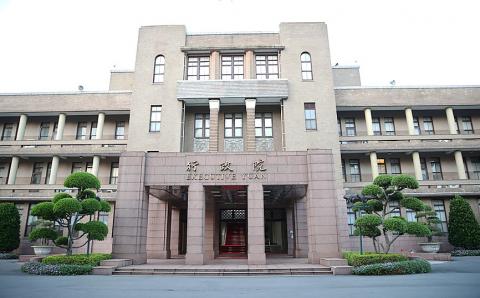The Cabinet is this week to publish guidelines governing a ban on the use of Chinese information technology (IT) products by central and local government offices, an Executive Yuan official who declined to be named said yesterday.
Entitled “Guidelines for Utilization of Mainland Area-Made Information Technology Products by Public Agencies” (各公務機關使用陸資產品處理原則), the executive order would apply broadly to any foreign-made product deemed to pose a security risk, the official said.
The guidelines cover mobile devices, security cameras and server components among others, and Chinese companies affected by the ban could include Huawei Technologies Co, Hangzhou Hikvision Digital Technology Co and ZTE Corp, the official said.

Photo: Liao Chen-huei, Taipei Times
The Executive Yuan believes it has the legal authority to impose the guidelines on local government offices, the official added.
Executive Yuan spokeswoman Kolas Yotaka said that the guidelines are nearly complete and they are to affect government offices and public employees, not private citizens or enterprises.
The Executive Yuan is nearly finished with drafting the order and Premier Su Tseng-chang (蘇貞昌) is expected to approve the guidelines in the coming days, when it becomes a publicly available document, she said.
In related news, industry sources said that many of the public and private buses use Huawei products to provide passengers with free Wi-Fi services.
Zhinan Bus Co, which operates in Taipei and New Taipei City, said that about 400 of its buses use Huawei products to provide riders with free Wi-Fi.
In New Taipei City, Zhinan buses have been using routers made by MikroTik in Latvia that are coupled with Huawei-made 4G network cards to provide Wi-Fi services.
Huawei network cards are costly, but offer superior stability and connection speed, while the Chinese company’s business agents had also been more helpful during installation, Zhinan said, adding that it has not received any customer complaints regarding information security.
Capital Bus Co general manager Lee Chien-wen (李建文) said his company tried to stick with Taiwanese cards, but had to purchase 20 Huawei-made cards after some of the Taiwanese products repeatedly broke down.
“We are a private business and we receive no public subsidies for purchases,” he said.
“The paperwork for those purchases are in order and our business follows the law scrupulously,” he said.
However, the use of Huawei components anywhere in the circuit of a hotspot device, Wi-Fi router or network base station could open data to backdoor exploits, former National Applied Science Laboratories vice president Lin Ying-dar (林盈達) said.
“Since most free Wi-Fi networks are not protected by passwords or encryption, the browsing data are vulnerable to sniffing or interception by hackers,” said Lin, who teaches computer science at National Chiao Tung University.
“In many airports around the world, public Wi-Fi is known to be intercepted by hackers, as well as government agencies,” he said. “My advice is to use it as little as possible, or surf through an encrypted VPN [virtual private network].”

Taiwan is stepping up plans to create self-sufficient supply chains for combat drones and increase foreign orders from the US to counter China’s numerical superiority, a defense official said on Saturday. Commenting on condition of anonymity, the official said the nation’s armed forces are in agreement with US Admiral Samuel Paparo’s assessment that Taiwan’s military must be prepared to turn the nation’s waters into a “hellscape” for the Chinese People’s Liberation Army (PLA). Paparo, the commander of the US Indo-Pacific Command, reiterated the concept during a Congressional hearing in Washington on Wednesday. He first coined the term in a security conference last

Prosecutors today declined to say who was questioned regarding alleged forgery on petitions to recall Democratic Progressive Party (DPP) legislators, after Chinese-language media earlier reported that members of the Chinese Nationalist Party (KMT) Youth League were brought in for questioning. The Ministry of Justice Investigation Bureau confirmed that two people had been questioned, but did not disclose any further information about the ongoing investigation. KMT Youth League members Lee Hsiao-liang (李孝亮) and Liu Szu-yin (劉思吟) — who are leading the effort to recall DPP caucus chief executive Rosalia Wu (吳思瑤) and Legislator Wu Pei-yi (吳沛憶) — both posted on Facebook saying: “I

Sung Chien-liang (宋建樑), who led efforts to recall Democratic Progressive Party (DPP) Legislator Lee Kun-cheng (李坤城), was released on bail of NT$80,000 today amid outcry over his decision to wear a Nazi armband to questioning the night before. Sung arrived at the New Taipei District Prosecutors’ Office for questioning in a recall petition forgery case last night wearing a red armband bearing a swastika, carrying a copy of Adolf Hitler’s Mein Kampf and giving a Nazi salute. Sung left the building at 1:15am without the armband and covering the book with his coat. Lee said today that this is a serious

A court has approved Kaohsiung prosecutors’ request that two people working for Democratic Progressive Party (DPP) Legislator Lin Dai-hua (林岱樺) be detained, as a probe into two cases allegedly involving her continues. The request was made on Friday, after prosecutors raided Lin’s two offices and the staffers’ residences, and questioned five on suspicion of contravening the Anti-Corruption Act (貪汙治罪條例). The people included the directors of Lin’s Daliao (大寮) and Linyuan (林園) district offices in Kaohsiung, surnamed Chou (周) and Lin (林) respectively, as well as three other staffers. The prosecutors’ move came after they interrogated Lin Dai-hua on Wednesday. She appeared solemn following